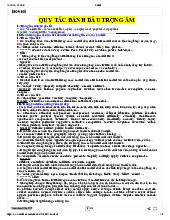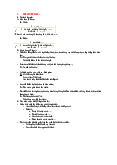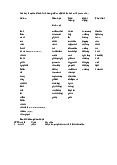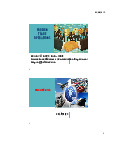



Preview text:
PART 1: NEGOTIATION
1. Definition: Negotiation is a basic means of getting what you want from others. It
is back-and-forth communication (sự giao tiếp qua lại) designed to reach (để đạt
được) an agreement when you and the other side have some interests that are
shared and others that are opposed (đối lập) 2. Features: Maximize Common benefits ( ) and minimize
tối đa hóa lợi ích chung
conflicting private ones (giảm thiểu xung đột lợi ích riêng).
Negotiation aims at Agreement, not Winning position.
Negotiation is affected by the status (địa vị) and power of both parties.
Negotiation: an art (nghệ thuật) and science (khoa học). 3. PART 2:
Power distance: all individuals in sociaties are not equal. the extent to which the
less powerful members of institutions and organisations within a country
expect and accept that power is distributed unequally (mức độ mà những thành
viên ít quyền lực của một tổ chức hoặc thể chế (hoặc gia đình) chấp nhận và kỳ
vọng rằng quyền lực được phân bổ không công bằng)
Malay,Viet Nam: Vietnam scores high on this dimension (score of 70) which means
that people accept a hierarchical order in which everybody has a place. Hierarchy in
an organization is seen as reflecting inherent inequalities. subordinates expect to be
told what to do and the ideal boss is a benevolent autocrat. Challenges to the
leadership are not well-received.
New zealand: With a score of __on this dimension. Within organizations, hierarchy
is established for convenience, superiors are always accessible and managers rely on
individual employees and teams for their expertise. Both managers and employees
expect to be consulted and information is shared frequently.
Individualism: this dimension is the degree of interdependence a society
maintains among its members (mức độ phụ thuộc lẫn nhau “I” or “we”).
Individualist societies (xã hội theo chủ nghĩa cá nhân) chăm sóc cho bản thân
và gia đình trực hệ. Collectivist societies ( chủ nghĩa tập thể) chăm sóc nhau
để đổi lấy sự trung thành.
Chọn individualism khi viet nam thấp hơn so với nước khác.
Viet nam: Vietnam, with a score of 30 is a collectivistic society. This is manifest in a
close long-term commitment to the “member” group, be that a family, extended
family, or extended relationships. Loyalty in a collectivist culture is paramount and
overrides most other societal rules and regulations. Such a society fosters strong
relationships, where everyone takes responsibility for fellow members of their group.
In collectivistic societies, offense leads to shame and loss of face. for ex:
employer/employee relationships are perceived in moral terms (like a family link),
and hiring and promotion take account of the employee’s in-group. Management is the management of groups.
UK: Với số điểm 76, Vương quốc Anh là một xã hội theo chủ nghĩa Cá nhân.
Người Anh là những người theo chủ nghĩa cá nhân và kín đáo cao độ. Trẻ em
được dạy từ khi còn nhỏ cách suy nghĩ cho bản thân và tìm hiểu mục đích duy
nhất của chúng trong cuộc sống là gì và chúng có thể đóng góp độc đáo như thế
nào cho xã hội. Con đường dẫn đến hạnh phúc là thông qua sự thỏa mãn cá nhân.
Khi mức độ giàu có của nước Anh tăng lên trong suốt thập kỷ qua, với sự giàu có
cũng ‘lan rộng về phía Bắc’, một hiện tượng được thảo luận nhiều là sự trỗi dậy
của cái được coi là chủ nghĩa tiêu dùng tràn lan và sự củng cố của văn hóa ‘ME’...
Motivation towards achivement and success: động lực hướng tới thành công và thành tựu
Việt nam: Vietnam scores 40 on Motivation towards Achievement and Success
and is thus considered a Consensus society - the focus is on “working in order to
live”. Managers strive for consensus, and people value equality, solidarity, and quality
in their work lives. Incentives such as free time and flexibility are favored. An
effective manager is a supportive one, and decision-making is achieved through involvement.
Other>70: With a score of __on this dimension that the society will be driven by
competition, achievement and success, with success being defined by the
winner / best in field - a value system that starts in school and continues
throughout organizational life.
EX: italy (Italians show their success by acquiring status symbols such as a
beautiful car, a big house, a yacht and travels to exotic countries.)
Uncertainty avoidance: tránh né sự không chắc chắn. mức độ mà con người trg
xã hội cảm thấy bị đe dọa bởi những tình huống mơ hồ.
Chọn dimension này khi việt nam thấp hơn nước khác
Viet nam: Vietnam scores 30 on this dimension. Low UAI societies maintain a
more relaxed attitude in which practice counts more than principles and deviance
from the norm is more easily tolerated. In societies exhibiting low UAI, people
believe there should be no more rules than are necessary and if they are
ambiguous or do not work they should be abandoned or changed, innovation is not seen as threatening
Other>70: which means people in this society do not feel comfortable in
ambiguous situations, they do not like change. Individuals in society like clarity
and stability, tend to worry about the future and prevent risks by building strict
rules, educational systems and organizations.
Japan: Japan is prone to natural disasters (earthquakes, tsunamis) so they are
always prepared for all situations and also for social aspects. In corporate Japan, a
lot of time and effort is put into feasibility studies and all the risk factors must be
worked out before any project can start.
France: The French don’t like surprises. Structure and planning are required.
Before meetings and negotiations they like to receive all necessary information.
Russia: Russians feel very much threatened by ambiguous situations, as well as they
have established one of the most complex bureaucracies in the world
Long term orientation: các mối quan hệ, định hướng lâu dài.
Viet Nam: Vietnam, with a score of 47, has a moderate score in Long-Term
Orientation, suggesting a balanced approach between traditional values and a
willingness to adapt to modern influences. There is an appreciation for both long-
standing cultural practices and the need for progress and innovation.
Others>60: With a score of __on this dimension, making it pragmatic. In societies
with a pragmatic orientation, people believe that truth depends very much on
situation, context, and time. They show an ability to adapt traditions easily to
changed conditions, a strong propensity to save and invest, thriftiness, and
perseverance in achieving results.
Indulgence: mức độ kiểm soát ham muốn dựa vào nuôi dạy. Indulgence and restraint.
Việt Nam: A low score of 35 on this dimension indicates that the culture of Vietnam
is characterized as Restrained.Societies with a low score in this dimension tend
towards cynicism and pessimism. Restrained societies do not put much emphasis on
leisure time and control the gratification of their desires. People have the perception
that their actions are Restrained by social norms and feel that indulging themselves is somewhat wrong.
Others>70: With a score of __on this dimension.____is an Indulgent country.People
in societies generally exhibit a willingness to realize their impulses and desires about
enjoying life and having fun. They possess a positive attitude and tend towards
optimism. In addition, they place a higher degree of importance on leisure time, act
as they please, and spend money as they wish.




